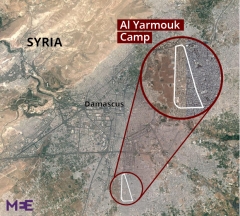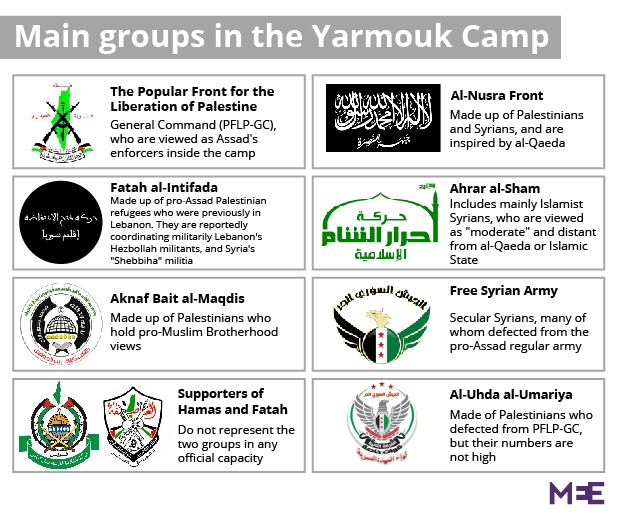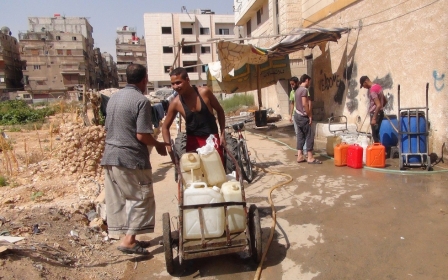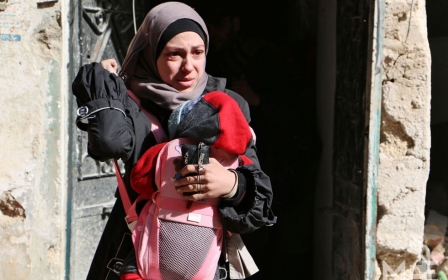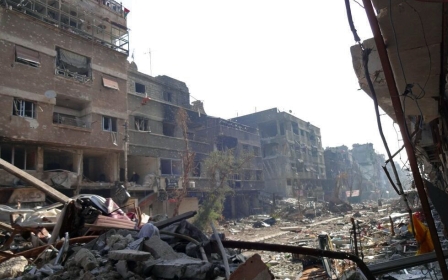'Breaking the silence' on Syria's besieged Yarmouk camp
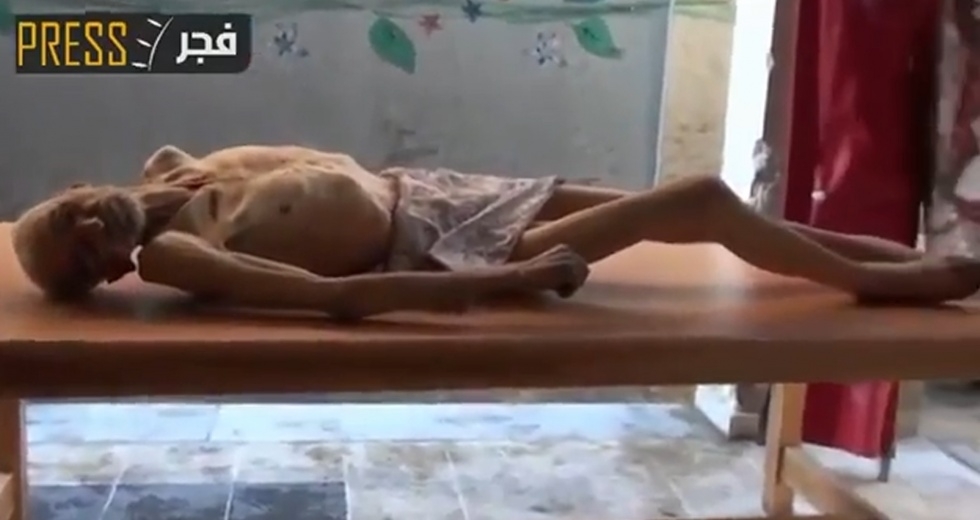
Palestinian and Syrian residents inside the Yarmouk refugee camp in Damascus, which has been under siege for over two years by forces loyal to President Bashar al-Assad, are complaining that their rapidly deteriorating humanitarian conditions are being met with international indifference.
Palestinians inside the camp in particular are frustrated with how their plight is being ignored by activists and campaigners who are traditionally known to be supporting the cause of Palestine - including fellow compatriots.
"The international media is already unfair towards us [Palestinians], but at least we had people from around the world exposing Israel's war crimes on social media and other small outlets," a former Palestinian resident of the camp, who did not wish to be named, told MEE.
"But Palestinians of Yarmouk face three layers of censorship: the international media, groups who claim to be supportive of Palestine, and Palestinian officials and activists who hardly mention us," he added.
"In order to break the siege, you need to first break the silence surrounding it."
Palestinian refugees took to the streets of the camp ten days ago to protest against the siege, where more than 170 people have reportedly died from dehydration, severe malnutrition or disease.
The camp, under siege since December 2012, is now home to some 18,000 people who have nowhere else to go. But prior to that, an estimated 160,000 people lived there, before forces loyal to Assad began shelling the camp, destroying much of its infrastructure, making it another casualty of Syria's civil war.
Like all other areas under Assad's control, the smallest hint of dissent would not be tolerated, but what compounded the problem in Yarmouk was that different armed groups inside the camp – which hosts Syrians as well as Palestinians - had different loyalties.
Main groups inside the Yarmouk camp
Sources from inside the camp have identified the key armed groups operating in and around the camp. On one side you have:
*The Popular Front for the Liberation of Palestine – General Command (PFLP-GC), who are viewed as Assad's enforcers inside the camp.
*Fatah al-Intifada, made up of pro-Assad Palestinian refugees who were previously in Lebanon. They are reportedly coordinating militarily Lebanon's Hezbollah militants, and Syria's "Shebbiha" militia.
On the other side there is:
*Aknaf Bait al-Maqdis, made up of Palestinians who hold pro-Muslim Brotherhood views.
*Al-Uhda al-Umariya, made of Palestinians who defected from PFLP-GC, but their numbers are not high.
*Supporters of Hamas and Fatah, but who do not represent the two groups in any official capacity.
*Al-Nusra Front, which made up of Palestinians and Syrians, and are inspired by al-Qaeda.
*Ahrar al-Sham, which includes mainly Islamist Syrians, who are viewed as "moderate" and distant from al-Qaeda or Islamic State.
*Free Syrian Army, secular Syrians, many of whom defected from the pro-Assad regular army.
Critics accuse Hamas – which has thrown its political support behind the Syrian uprising - of operating through its supporters in the camp, not officially, although Assad had accused the military wing of the Palestinian movement of training rebel fighters elsewhere in Syria.
However, Hamas denies any military involvement anywhere in Syria, maintaining that "though the movement stands by the Syrian people, sympathises with them and supports their legitimate demands, this does not indicate any [military] involvement on our part."
Syrians loyal to Assad dispute this. "Syrians [who support Assad] will never forget the betrayal of Hamas. We gave them weapons to use against the Israelis but they turned those guns on us," Raghad Ghesen, a London-based Syrian journalist told MEE.
Humanitarian crisis
Last year, Amnesty International accused the Syrian government of "using starvation of civilians as a weapon of war", adding that the "siege of Yarmouk amounts to collective punishment of the civilian population."
UNRWA spokesman Chris Gunness on Monday requested again the "relevant authorities to facilitate the distribution of humanitarian assistance to the civilian population," adding that the international body "remains deeply concerned that no successful humanitarian distributions have taken place since 6 December."
"Cutting the water supply [forces] residents to leave for surrounding areas on foot to collect small amounts of drinking water, [and] the severe lack of water suitable for daily needs such as personal hygiene [also] leads to the spread of disease, especially among children," Mahmoud Nassar, a legal activist inside the camp said in a recent report on the water crisis.
"The siege also affects the agricultural projects that some organisations carry out to ease the food deficiency," he added in the report, conducted by the Palestinian League for Human Rights – Syria.
Despite the gruesome effects of the siege on the camp, the residents of Yarmouk are finding ways to cope. "Since electricity is cut off, we have been recharging our laptops and phones by generating power through reversing the dynamo of electric bikes," Rami al-Sayed, a Syrian media activist who is critical of Assad but not affiliated with any armed group, told MEE.
"We are cooking on coal and burning our furniture for heat," said al-Sayed. "But this can't go on forever. Those who were able to leave have fled the country, but the rest of us have to deal with regime snipers, shortage of medicine or sky-high food prices sold by the regime's black market merchants."
Tough conditions for refugees outside the camp
Living conditions have also been very hard for the Palestinian refugees who had fled the camp and are currently living in Damascus.
"It is not just those inside the camp who are suffering. The cost of living for us [Palestinians outside the camp] is very high and the rent prices are unaffordable," Mohamed, a Palestinian activist who had left the camp and did not wish for his second name to be published, told MEE.
Mohamed said that there is some food being smuggled into the camp, but at unreasonably inflated prices. "Syrian merchants from the nearby areas are abusing the situation inside the camp to make more profit for themselves."
He said that many Palestinians of the camp are blaming their own leaderships for not agreeing on a united method to end the crisis.
"The people used to have dreams of one day returning to their original homes in Palestine. Now most people are thinking of how to go somewhere safe, like Europe," said Mohamed.
Deafening silence
Aside from few human rights reports, the siege has continued largely unnoticed. "While the Syrian regime made global headlines with its use of chemical weapons, its use of starvation has largely slipped under the radar, even though it is far more pervasive," wrote Shane Bauer in an article entitled 'The Hunger Game', published in Mother Jones.
Palestinian officials have been complicit too in the silence.
"What makes [this crisis] stand out is the lack of public reaction many Palestinians have had to this catastrophe. There has been a decidedly muted response and coverage of the slaughter of this segment of Palestinians," wrote Palestinian-American commentator Talal Alyan in the Huffington Post.
"The siege on Yarmouk, the issue of who is at fault, boils down to one essential point: the practice of collective punishment. Either one opposes this cruel practice, whether in Gaza or Yarmouk, or they don't," he added.
Alyan argued that the "Assad dynasty relies heavily on the idea of Palestine in its propaganda. The very least that Palestinians outside Syria can do is publically and continuously deny the Syria regime use of Palestine as a shield in their slaughter of Palestinians."
His view was shared by other observers.
"Critics have pointed out that the Syrian regime justifies this brutal siege on Yarmouk with many of the same excuses Israel has used to justify its illegal siege on Gaza," wrote Ben Norton, freelance writer and journalist, in article published in Mondoweiss.net.
"Paralleling Israeli officials' arguments about Hamas and Gaza, Assad characterizes Yarmouk as a hotbed for terrorists who oppose his rule and argues that it is therefore justified to bomb, shell and starve civilian areas in order to uproot such a presence," he added.
"One of the principal ways in which Assad has tried to justify his rule is with claims that he, unlike the Arab countries surrounding Syria, supports the Palestinian people. Many Palestinians in Yarmouk, nevertheless, have found such a claim to ring hollow and unsubstantiated."
Sources in the camp confirmed that the situation is less favourable for Palestinians.
"The regime expects Palestinians in the camp to show more loyalty [towards Assad]. If a Palestinian is suspected of anything wrong [from the regime's perspective], then his punishment would be much more severe," said al-Sayed.
New MEE newsletter: Jerusalem Dispatch
Sign up to get the latest insights and analysis on Israel-Palestine, alongside Turkey Unpacked and other MEE newsletters
Middle East Eye delivers independent and unrivalled coverage and analysis of the Middle East, North Africa and beyond. To learn more about republishing this content and the associated fees, please fill out this form. More about MEE can be found here.


